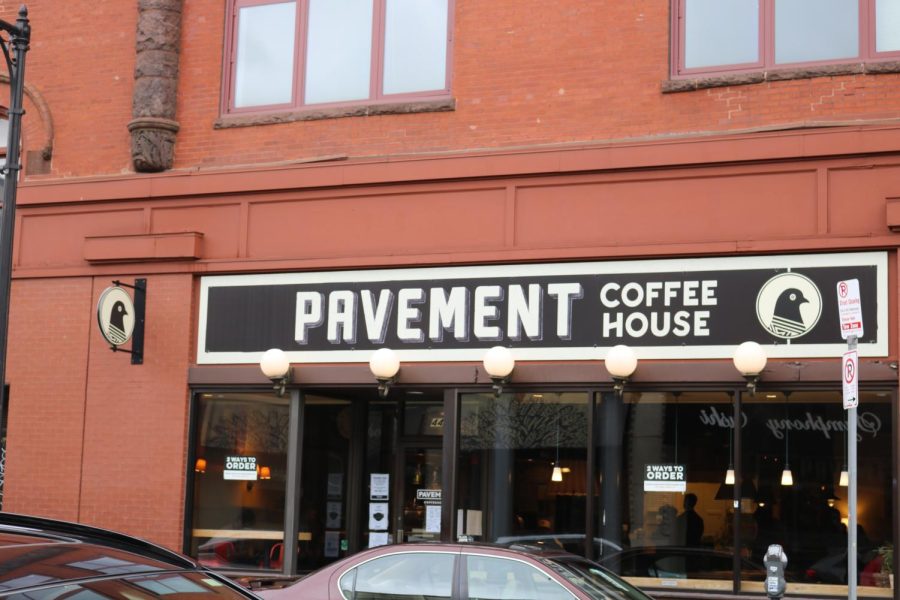Coffee shop staff move to form unions, progressing labor movement in the city
Pavement Coffeehouse employees across locations, as well as other local cafes, have moved to solidify their organizing committee and form a union. Photo credit Harriet Rovniak.
December 18, 2021
When Collin Tyrrell started working at the Boston University location of Pavement Coffeehouse in April 2021, there was no talk of creating a unionized workforce in the cafe.
But as summer rolled in, Pavement employees across locations had moved to solidify their organizing committee and form a union. On June 1, members of the committee — represented by the New England Joint Board UNITE HERE union and organized under the name Pavement UNITED — sent a letter to founder Larry Margulies with the intent to unionize. A mere two weeks later, Pavement became the first coffee shop chain in Massachusetts with a unionized workforce after Margulies recognized the union.
The bargaining process for Pavement workers is still underway today, Tyrrell said.
“Forming the union and being recognized was just the start of it, and the big fights happen when you’re negotiating the contract,” Tyrrell said.
In the months after Pavement UNITED’s win, other coffee shop workers have joined the movement to improve labor conditions.
In Cambridge, employees at Darwin’s Ltd. followed suit, unionizing in September. Fast forward to December, the baristas, bakers and other staff members of Diesel Café, Bloc Café and Forge Baking Company, or DBF, declared their intent to unionize jointly. A week later, Starbucks workers from the Allston and Brookline locations filed for union recognition.
Tyler Daguerre, who is part of the Starbucks Workers United Organizing Committee, said the Starbucks stores’ movements are in solidarity with the Buffalo location that formed the first union at the chain in the United States.
Daguerre connected with an organizer who had worked for the Buffalo labor push with Workers United to kickstart the process of forming a union. After witnessing the victory at the Buffalo location, he said the organizing committee was solidified and launched their campaign, handing out union sign-up cards for staff to sign after about three months of internal administrative work. The Allston location at 1304 Commonwealth Ave. and the Brookline location at 277 Harvard St. signed 85% and 70% of their employees, respectively.
“It’s really exciting, it’s a huge honor. I feel so much support not only with my committee, but with working with the store in Allston and also … with the organizers in Buffalo,” Daguerre said. “It’s such an open and comfortable partnership.”
At Pavement, Tyrrell said that the unclear structure of the corporate ladder has caused confusion for raises since it was “never fully communicated and seemed a little arbitrary.”
He also discussed the tip pooling system, which is based on splitting the tips from all Pavement locations and distributed evenly into every employee’s paychecks.
“On one hand, it’s good for the slower stores because you don’t have undocking pay because you don’t have more customers,” Tyrrell said. “But on the other hand, that means you’re still relying on customers to have our pay.”
Some of the issues Tyrrell is advocating for include sick leave, mental health days, clear criterias for breaks and better wage transparency.
“There’s that stigma of, ‘it’s always the college student, a teenager or someone in their early 20s working as a barista,’ and it’s that transition job until you get a real job,” Tyrrell said. “We wanted to assert that what we do is a real job. It’s skilled labor, and our work is worth more than what we’ve been receiving.”
Daguerre believes that moving to unionize is a good idea for workers everywhere to protect themselves from wrongful termination or intimidation. Unions can also give more bargaining power to improve wages and benefits, Daguerre said.
At his location in Brookline and the sister location in Allston, Daguerre said he has a great working relationship with his manager. The decision to form a union was to have a safety net as a whole.
“This is just workers collectively coming together to have protections and to be able to advocate for ourselves in our own workplaces rather than corporate telling us what to do or being able to control us,” Daguerre said. “This is just all about equal bargaining power. So this has nothing to do with our manager.”
New England Joint Board UNITE HERE Communications and Political Director Mitchell Fallon said he is looking forward to advocating for workers’ rights and expanding non-discrimination protections for housing, gender identity and other statuses. As a whole, the unions will create a safety barrier for workers in the food and beverage industry, as well as the retail world.
“In these spaces, the reported rates of discrimination, harassment, assault are higher than in other industries, and that’s just what’s reported,” Fallon said. “Labor unions are able to step in and create some structure that helps prevent some of this.”
The New England Joint Board UNITE HERE affiliate unions, Pavement UNITED, Darwin’s UNITED and DBF UNITED, are in various stages of unionizing. Pavement and Darwin’s are currently in the process of negotiations, but DBF is still waiting for an official card check to take place, Fallon said.
“It’s true that government and private industry could be solving these problems, but we don’t have the time to wait,” Fallon said. “We don’t have the time to see if they’re able or willing to solve these problems. So unions continue to be a workers’ best method for securing the rights that they own.”
When customers walk into a cafe location, Fallon said they might notice happier workers over the counter with no other drastic changes. But for employees, it’s a different story.
“For the workers themselves, a lot of things are on the table,” Fallon said. “Those are things that do go back to the bedrock of having a contract, which is having those labor management meetings, being able to hash out things on a more equal footing than having to confront your boss one-on-one where you may face repercussions for that.”
Daguerre said he is pleased to see that customers and others around him have come to support the labor movement. He said that in the Allston and Brookline locations, tipping in cash is highly encouraged to show support.
“Workers have so much power collectively, but the intimidation and fear that we have that’s leftover from all the union busting that happened … has scared a lot of people and just misinformed them as to what a union is,” Daguerre said. “The union is us just banded together and there’s power in numbers, so I think more people are waking up to that.”


















